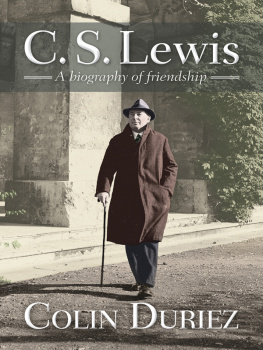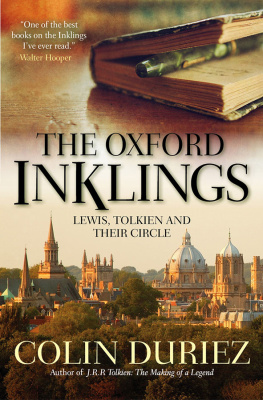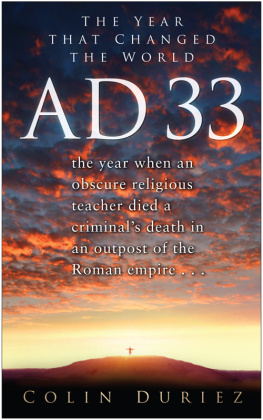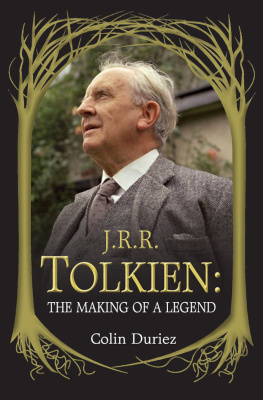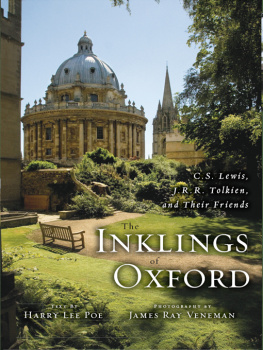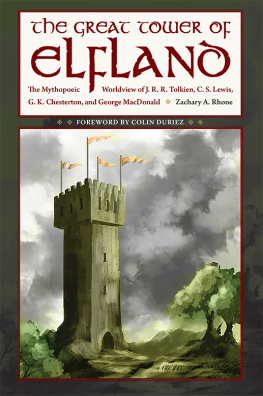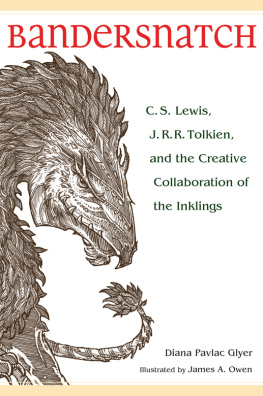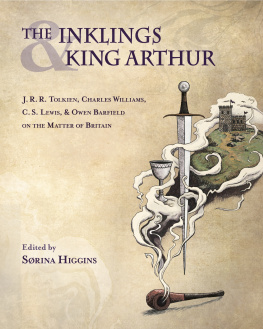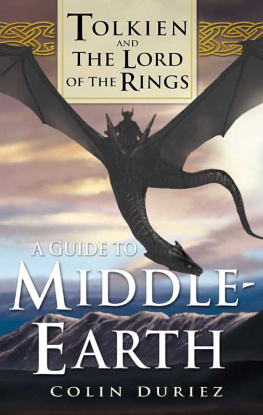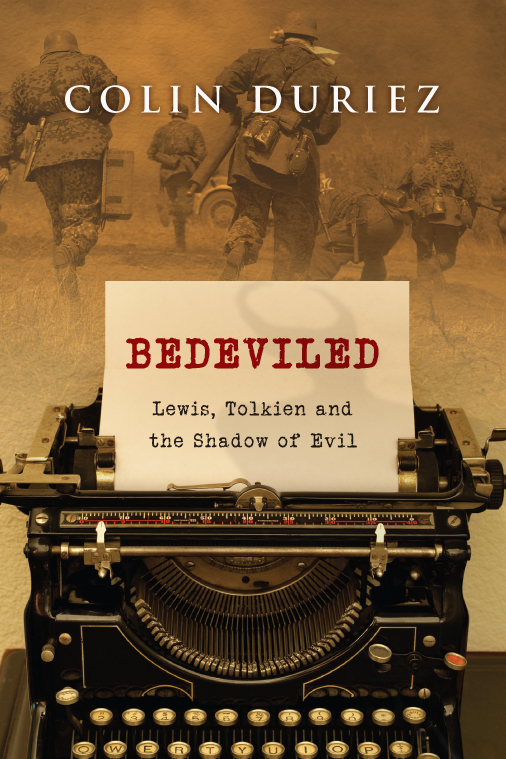BEDEVILED
Lewis, Tolkien and
the Shadow of Evil
COLIN DURIEZ

www.IVPress.com/books
InterVarsity Press
P.O. Box 1400, Downers Grove, IL 60515-1426
2015 by Colin Duriez
All rights reserved. No part of this book may be reproduced in any form without written permission from InterVarsity Press.
InterVarsity Press is the book-publishing division of InterVarsity Christian Fellowship/USA, a movement of students and faculty active on campus at hundreds of universities, colleges and schools of nursing in the United States of America, and a member movement of the International Fellowship of Evangelical Students. For information about local and regional activities, visit intervarsity.org.
Scripture quotations, unless otherwise noted, are from The Holy Bible, English Standard Version, copyright 2001 by Crossway Bibles, a division of Good News Publishers. Used by permission. All rights reserved.
Cover design: Cindy Kiple
Images: old typewriter:slobo/iStockphoto
WWII battle scene:Johncairns/iStockphoto
blank key from manual typewriter: FlamingPumkin/iStockphoto
ISBN 978-0-8308-9812-1 (digital)
ISBN 978-0-8308-3417-4 (print)
To Ian Blakemore
Contents
1 C. S. Lewis in Wartime
The Cosmic Battle
2 Devilry and the Problem of Hell
The Screwtape Letters
3 Inklings in Wartime
Themes of Spiritual Conflict
4 Images of the Dark Side
The Lord of the Rings
5 Right and Wrong as a Clue to Meaning
The Problem of Pain and Mere Christianity
6 Exploring What Is Wrong with the World
The Cosmic Trilogy
7 Progress and Regress in the Journey of Life
The Pilgrims Regress
8 The Divide Between Good and Bad
Tolkiens Leaf by Niggle and Lewiss The Great Divorce
9 The Power of Change
The Chronicles of Narnia
10 Pain and Love
The Four Loves, Till We Have Faces and A Grief Observed
11 Release from Hells Snares
Lewis and the Road Out of the Self to Gain the Self
12 The Way of Goodness and the Far Country
Narnia and Middle-Earth
Hobgoblin nor foul fiend
Can daunt his spirit,
He knows he at the end
Shall life inherit.
T HE P ILGRIM S ONG,
J OHN B UNYAN
Introduction
T here are dangers in talking about a cosmic battle between good and evil. Most of all, it implies for many people that a permanent battle is raging between the forces of darkness and light. This is far from the understanding of C. S. Lewis and his friends in the now famous Oxford literary group, the Inklings. They mainly saw a figure such as the devil not as equal with God but as a created spiritual being of some kind, an angel of high rank, who had turned deliberately to evil from his original goodness. Though we are used to thinking of the universe very much in material, physical terms, the friends believedand Lewis was in the vanguard of arguing fora larger view of reality, a supernatural one.
Nevertheless, it was clear to them that a battle between good and evil was in process, both in the unseen world and in the physical and psychological horrors of human warfare. Most of the core members of the Inklings had experienced battle in World War I. Some bore physical or mental scars. Were they alive today, their view of a spiritual conflict behind physical battles, which affected whether or not people could live at peace and free from terror, would undoubtedly be reinforced. J. R. R. Tolkien for instance considered that the weapons of Sauron, the Dark Lord of The Lord of the Rings, had been used by the allies as well as the enemy in World War II, and C. S. Lewis expressed grave doubts about the massive bombings of civilians.
Because, among the Inklings, Lewis was at the forefront of writing on human pain, suffering, devilry, miracles and the supernatural, he provides the main focus of this book. This is not to say that other Inklings members did not write extensively on these themesmost famously, Tolkien in his The Lord of the Rings. They therefore come into my book, where relevant, as much as possible in its short compass. The chronology of Lewiss writings is followed to a large extent in part two. In part one, his writings are more tied into his experience of two world wars, even though the more recent war was not a firsthand one for him. In part one, we also look at Tolkiens The Lord of the Rings, in its relevance to the imagery of war and evil. Tolkiens story, of course, is well known throughout the globe in its original print form, and now through Peter Jacksons blockbuster movie version.
It is worth pointing out from the onset that C. S. Lewis had no interest in writing literally about what goes on in the afterlife to satisfy curiosity about this. He doesnt take up popular imagery that is supposedly describing what happens when the spirit leaves the body at death, imagery that might portray a tunnel with light in the distance (based on accounts of near-death experiences). His accounts of heaven and hell are very different from each other according to the purpose of the book: there are different sets of imagery in his dream story, The Great Divorce, which is about an excursion by bus from hell to the borderlands of heaven, and the Narnian story The Last Battle. The Screwtape Letters is cast in yet another pattern of imagery, in which hell resembles a mixture of rampant bureaucracy like in Hitlers Third Reich and a ruthless modern corporation. His treatment of the afterlife and the supernatural world is therefore in stark contrast to Richard Mathesons bestselling novel What Dreams May Come (also made into a movie), which claims to be based on research and to give factual details of heaven and hell. In his brief prologue to his reader, Richard Matheson says, Because [the novels] subject is survival after death, it is essential that you realize, before reading the story, that only one aspect of it is fictional: the characters and their relationships. He adds, With few exceptions, every other detail is derived exclusively from research. He even provides a bibliography, including titles that are based on theosophy, a movement which seeks hidden knowledge for enlightenment and salvation.
Lewis was careful to state the opposite. Where he writes fictionally about the unseen world, and heaven and hell, he is not writing factually and literally about the afterlife. He warned in his preface to The Great Divorce:
I beg readers to remember that this is a fantasy. It has of courseor I intended it to havea moral. But the transmortal conditions are solely an imaginative supposal: they are not even a guess or a speculation at what may actually await us. The last thing I wish is to arouse factual curiosity about the details of the after-world.
In his youth he had dabbled in the occult (ironically, this was in his long period as an atheist) and realized the dangers of its compulsive attraction for him. Though he firmly believed in the actuality of heaven and hell, in his fictional books he explored these realities through what he called supposals in stories of his own makingthough these did draw upon the imaginations of other writers such John Milton, Dante and many others from his extensive reading. He also regarded biblical imagery of heaven and hell as authority of the first order. In The Problem of Pain


